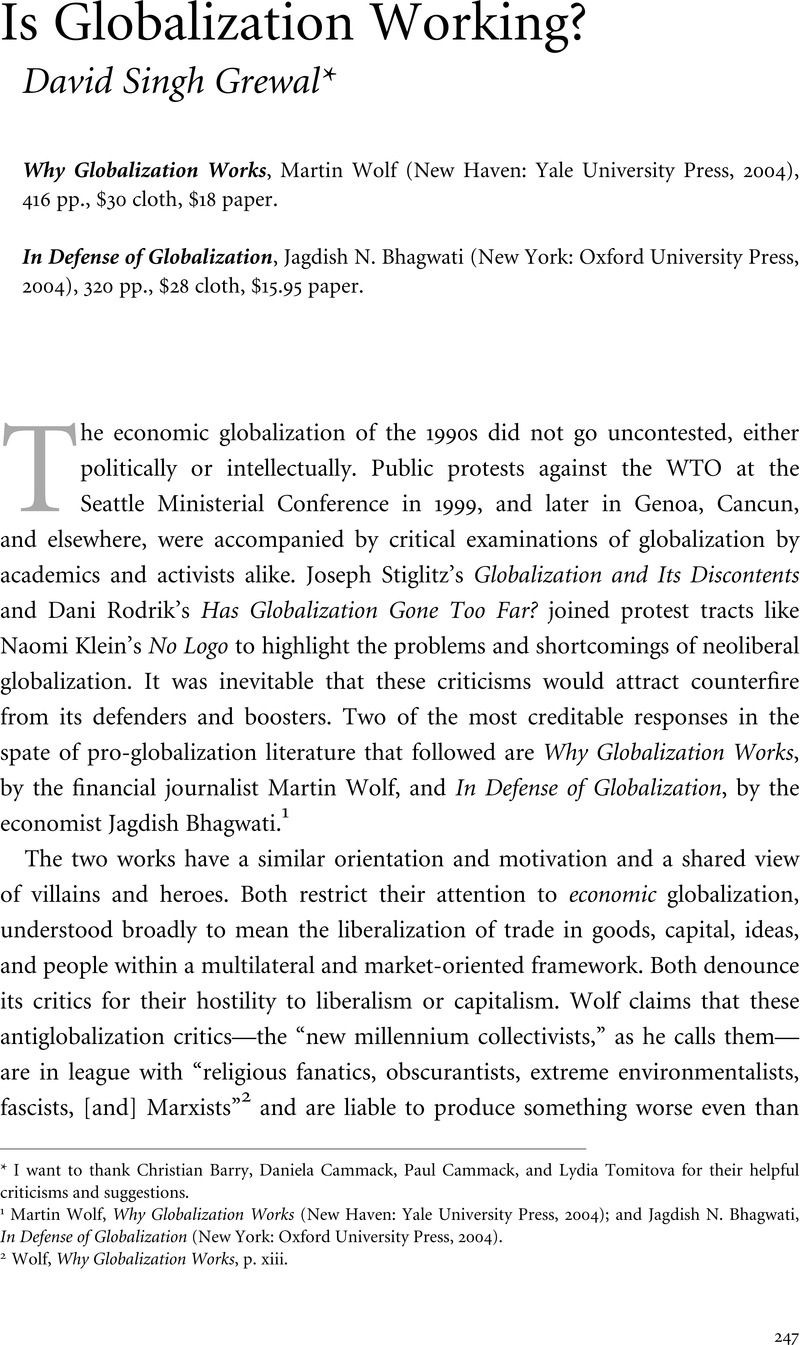Article contents
Is Globalization Working?
Published online by Cambridge University Press: 25 March 2011
Abstract

- Type
- Review Essay
- Information
- Copyright
- Copyright © Carnegie Council for Ethics in International Affairs 2006
References
1 Martin Wolf, Why Globalization Works (New Haven: Yale University Press, 2004); and Jagdish N. Bhagwati, In Defense of Globalization (New York: Oxford University Press, 2004).
2 Wolf, Why Globalization Works, p. xiii.
3 Ibid., p. 11.
4 Bhagwati, In Defense of Globalization, p. 15.
5 Wolf, Why Globalization Works, p. xvii.
6 Ibid., p. 4.
7 See Dani Rodrik, “Comments at the Conference on ‘Immigration Policy and the Welfare State, ’” Trieste, June 23, 2001; available at http:\\www.ksghome.harvard.edu/~drodrik/papers.html.
8 See Jeffrey G. Williamson, “Globalization, Convergence, and History,” Journal of Economic History 56, no. 2 (1996), pp. 277–306, 294–95.
9 Bhagwati, In Defense of Globalization, p. 218.
10 Martin Wolf, “A Matter of More Than Economics,” Financial Times, April 13, 2004; available at http:\\www.yaleglobal.yale.edu/display.article?id=3701.
11 See Jagdish Bhagwati, “The Capital Myth: The Difference Between Trade in Widgets and Dollars,” Foreign Affairs 77, no. 3 (1998), pp. 7–12.
12 Bhagwati, In Defense of Globalization, pp. 204–06.
13 See Eswar Prasad, Kenneth Rogoff, Shang-Jin Wei, and M. Ayhan Kose, “Effects of Financial Globalization on Developing Countries: Some Empirical Evidence,” IMF, Washington, D.C., March 17, 2003; available at http:\\www.imf.org/external/np/res/docs/2003/031703.htm.
14 See Wolf’s chapter “Fearful of Finance,” in Wolf, Why Globalization Works, pp. 278–304.
15 The latest versions of Reddy and Pogge’s papers on this theme, both technical and popular (including their central paper, “How Not to Count the Poor”), are collected at http:\\www.socialanalysis.org, along with World Bank responses and media coverage.
16 Such a common achievement concept would probably include (without being restricted to) the attainment of minimal nutritional standards.
17 Wolf, Why Globalization Works, p. 163.
18 Sala-i-Martin’s work contains what the Nobel Prize winner Joseph Stiglitz has called “gross distortions” that seem aimed at showing a dramatic reduction in poverty under neoliberal policies. The work of the economist Surjit Bhalla, which also argues that poverty has fallen rapidly, attracted similarly fierce criticism at a Carnegie Council on Ethics and International Affairs conference on poverty estimation in 2003. See coverage of the conference at http:\\www.glovesoff.org/ringside_reports/poverty_040603.html.
19 Wolf, Why Globalization Works, pp. 16–17.
20 Bhagwati, In Defense of Globalization, p. 11.
21 David Hume, “Of the Jealousy of Trade” (1742), in Eugene F. Miller, ed., Essays (Indianapolis, Ind.: Liberty Fund, 1985), pp. 331.
22 For a standard account of the English mercantilist literature, see Douglas A. Irwin, Against the Tide: An Intellectual History of Free Trade (Princeton: Princeton University Press, 1996), pp. 26–42.
23 See Norman Angell, The Great Illusion: A Study of the Relation of Military Power in Nations to Their Economic and Social Advantage (New York: G. P. Putnam’s Sons, 1911), especially the chapters “The Great Illusion” and “The Impossibility of Confiscation,” pp. 29–62.
24 Bhagwati, In Defense of Globalization, p. 108.
25 Wolf, Why Globalization Works, p. 309.
26 Norman Angell’s doctrine was that “military and political power give a nation no commercial advantage; that it is an economic impossibility for one nation to seize or destroy the wealth of another, or for one nation to enrich itself by subjugating another.” Angell, The Great Illusion, p. vii. Wolf adopts these themes, and adds to them the unification of purpose that he hopes the “global war on terror” will bring to otherwise competing nations. Wolf, Why Globalization Works, pp. 309–10.
27 Ralph E. Gomory and William J. Baumol, Global Trade and Conflicting National Interests (Cambridge: MIT Press, 2000). Gomory and Baumol make an argument made earlier by John Stuart Mill and others concerned with the political economy of industrial development, as they recognize. Their book includes a closing chapter by Edward Wolff presenting empirical evidence that confirms the persistent specialization among industrialized countries that their argument suggests.
28 Ibid., p. 73.
29 Istvan Hont, Jealousy of Trade: International Competition and the Nation-State in Historical Perspective (Cambridge: Harvard University Press, 2005).
30 Ibid., p. 155.
- 3
- Cited by


